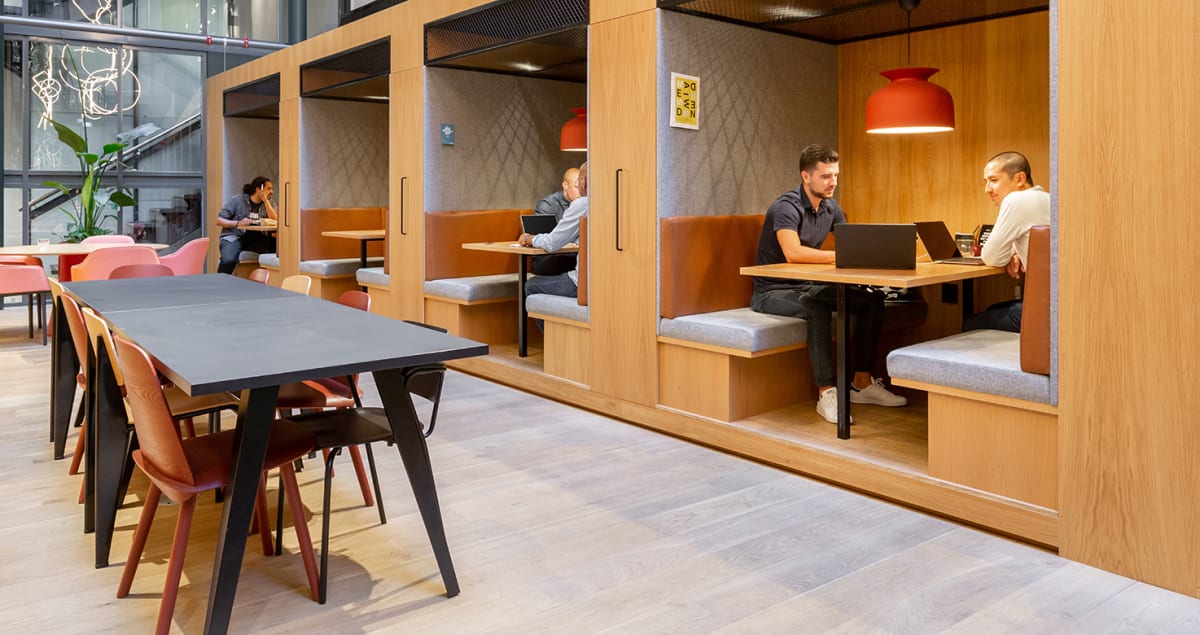As companies of all sizes review their real estate footprint and embrace hybrid working long-term, this trio of early adopters are mapping out a new style of workplace.
Covid-19 has forced CEOs and business leaders to read the writing that was already on the wall, pre-pandemic: the traditional concept of the office is no longer working. New research shows that 74% of firms – mostly in the financial services sector – are reviewing the role that real estate plays in their business, whether that’s using the space differently or reducing its size.
As restrictions are lifted in many countries, some companies have gone beyond talking about those changes and started to implement them. Here are three enterprises that are leading the way in transforming the workplace for a new era of working life.
Standard Chartered
Standard Chartered bank’s Chief Financial Officer, Andy Halford, recently suggested that “the word 'office' will become a bit of a thing of the past”. His company is certainly one of the front runners in the move to a hybrid way of working.
After listening to feedback from employees – the majority of whom favoured some form of hybrid work – the bank signed a groundbreaking deal with IWG in January 2021. This will offer Standard Chartered’s 95,000 employees access to 3,500 flexspaces throughout the world, offering them greater choice in terms of both working patterns and locations. By providing more ‘near home’ work locations, it’s hoped that the deal will also help cut commuting times and reduce the carbon footprint of the business.
Tanuj Kapilashrami, Standard Chartered’s Group Head of Human Resources, says that they expect the shift to hybrid to have a positive impact on productivity, as well as empowering them to recruit from a wider, more diverse talent pool in the future.
NTT
The employee experience is at the forefront of NTT’s business agenda and, like many companies looking to the post-pandemic future, is considering what role the office should play after months of home working.
NTT’s 2020 Intelligent Workplace Report found that the majority (86.4%) of businesses in the UK and Ireland believed employee needs will be at the heart of the future workplace design. NTT found that 77.6% of organisations agreed that home working has been challenging for many employees during the pandemic. Connectivity and workspace issues such as bandwidth, a feeling of isolation and a lack of dedicated workspace are all causes for concern for employers.
Steve Warner, NTT’s Vice President HR UK and Ireland, says as we emerge from the pandemic organisations will need to “design a flexible workplace that they can change as and when is needed”. C-suite members must therefore develop “a more robust strategy to permanently provide for a distributed workforce”.
With that in mind, the Japanese telecommunications group announced they were also embracing the hybrid work model, signing a deal with IWG to give its 300,000 employees access to the flexspace leader’s global office network.
NTT will retain some of its existing office network, using it as the ‘hub’ in a new hub-and-spoke set up. This will allow employees to stay close to home, basing themselves at nearby flexspaces (‘spokes’), but also ensure they have ongoing access to company HQs when needed.
CEO Mark La Neve says the deal will reduce employees’ commuting times and travel costs, as well as shrinking the company’s carbon footprint.
EY
One of the world’s largest professional service organisations and a major global employer, EY has 300,000 workers in 150 different countries – so it’s no surprise that it has chosen IWG to support its adoption of the hub-and-spoke model of working, post-pandemic.
“As one of the pioneers in flexible workplaces, we are uniquely positioned to help companies in a new way of working in an international network,” says Thomas Weeden, Country Manager of Norway and Finland at IWG.
The strategic partnership between IWG and EY Norway will see Spaces (part of IWG’s portfolio, alongside sister brand Regus) act as both hub-and-spoke for employees as Covid-19 lockdowns are eased.
Spaces will be integrated with EY Norway’s new HQ in Oslo, which is set to open in 2023. EY will occupy the top four floors of the building, known as Spaces Stortorvet 7, and will have exclusive use of their own roof terrace. In addition, staff will have access to the Spaces centre within the property, which is being developed with a strong focus on the overall employee and client experience, as well as with the environment in mind.
“Our agreement with IWG grants us access to meeting rooms, workstations and coworking facilities in Stortorvert 7… [as well as] access to Spaces’ coworking facilities both in Oslo – and the rest of the world,” explains Christin E Bøesterud, CEO EY Norway.
Find out how IWG’s corporate solutions can help your company adapt to the new world of work.






